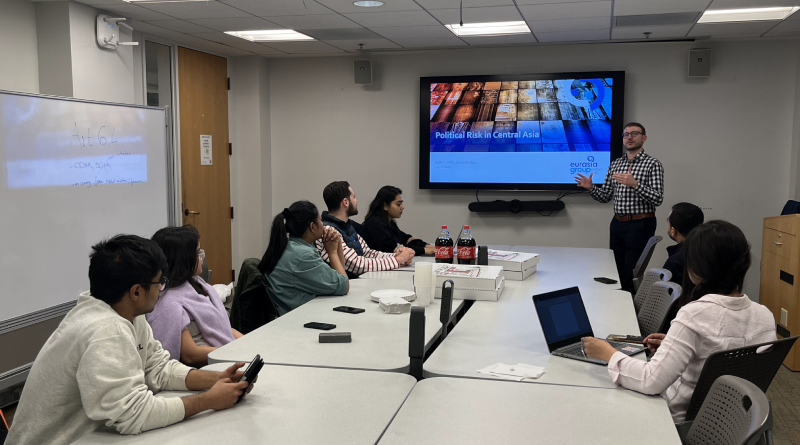Zachary Witlin on Political Risk in Central Asia
By Sarah Baughn, MALD 2024 Candidate, The Fletcher School
On April 4, 2023, Zachary Witlin, a Tufts University alumnus and a senior political risk analyst at Eurasia Group, discussed the prevailing political risks in Central Asia for the Fletcher Political Risk Group’s emerging markets lecture series.
Opening with the macro trends taking place in the region, Witlin first focused on “multivectorism,” a foreign policy approach of pursuing a variety of geopolitical partners as opposed to only one or two, and its “endurance” beyond the invasion of Ukraine. He also mentioned leadership transitions, rising nationalism, and a lack of regional integration as important macro trends.
Witlin explained that each Central Asian country has its own version of a multivector foreign policy, choosing to pursue multiple different international partners as opposed to one singular “benefactor.”
That is good news for many who want to work with Central Asia, because Central Asian countries have now largely declared neutrality instead of siding with Russia as they might have in the past. No country in Central Asia openly provides weaponry or supports any part of Russia’s assault on Ukraine. Though Central Asia’s close political, business, and security relations with Russia remain, there is potential for growth in trade and investment from the EU, the United States, and other partners.
Central Asian countries object to being labeled as passive participants in other neighbors’ “Great Game,” or as it is more commonly called these days “great power competition.” Instead, they advocate for viewing their relationships with other nations through the lens of the historical Silk Road.
Central Asian countries strongly object to being labeled as participants in the “Great Game,” or as it is more commonly called these days “great power competition.” Instead, they advocate for viewing their relationships with other nations through the lens of the historical Silk Road.
“These are both historical references, but with a Silk Road, you have prosperity. You have commerce. You have a lot of players involved in trade, and it’s a very positive spin focused on economics. Meanwhile, the ‘Great Game’ came about in the period of empires,” Witlin explained.
Most Central Asian states have recently undergone significant shifts in leadership, with the President of Kazakhstan Kassym-Jomart Tokayev replacing the long-lasting Nursultan Nazarbayev in 2019. All but one Central Asian country has come under new leadership since 2016, beginning with Uzbekistan. Tajikistan remains the exception.
Under new leadership, the Central Asian countries are making small changes; though dramatic restructuring seems far off, real reforms are being attempted at a steady pace. Uzbekistan and Kazakhstan in particular have made the most significant efforts to reform. President of Uzbekistan Shavkat Mirziyoyev “opened” the country from its previously closed status, enacting a significant transformation of the business sector, media, foreign policy, and many other domains. Since then, the government has focused primarily on smaller, gradual administrative improvements. Kazakhstan under Tokayev has announced similar intent.
As for rising nationalism and a lack of regional integration, Witlin pointed out that all Central Asian countries have prioritized nation building since the Soviet collapse. Though most identity models distinguish between the ethnic group and civic nationality, “ethnic-rooted” identities appear to have gained a foothold in the past five years. That is usually state-led, but Sadyr Japarov’s successful protests and seizure of government in the Kyrgyz Republic showed the potential for alternative anti-state establishment nationalism.
According to Witlin, the lack of regional integration means that all countries have pursued separate bilateral agreements with major countries outside of the region as opposed to creating dialogue between one another. A bloc of only Central Asian countries and no others does not exist, with longstanding regional organizations being led by Russia, China, or Turkey, and newer fora like the C5 + 1 led by the United States.
The political risk factors in the region remain the enduring risk of Russian uncertainty, especially due to the Russia-Ukraine war; the short-term predictability yet long-term unpredictability of authoritarian governments; the potential for social unrest; and a general uninterest in market reforms.

